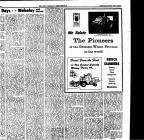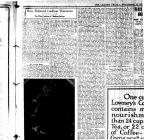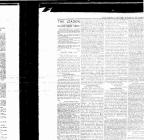2
"His name will ever be associated in our history, with those institutions which establish and foster justice, intelligence, and respect for law in the life of the people of this Province." -Written of Chief Justice Edward Ludlow Wetmore, first Chancellor of the University of Saskatchewan, shortly after his death.Chief Justice Edward Ludlow Wetmore played a vital role in the establishment of social, political, and legal institutions in the early pioneering days of the North-West Territories. His involvement, for example, in early trials under the auspices of the Supreme Court of the North-West Territories solidifies his importance as a figure in Canadian history.
Born in Fredericton, New Brunswick in 1841, Wetmore studied at King's College in Fredericton, earning a Bachelor of Arts degree with honours in 1859. He was called to the bar in 1864, and named QC in 1881.
Prior his arrival to the North-West Territories in 1887, Wetmore was involved in many aspects of the political system in New Brunswick, having served as mayor of Fredericton from 1874 to 1876 and as a Conservative Member of the New Brunswick House of Assembly for York from 1882-1886, when he was defeated in the General Election.
In 1887, he was appointed as a puisne judge of the Supreme Court of the North-West Territories for the district of Eastern Assiniboia, in which Wolseley was situated. Wetmore served most of his legal career as in this district and his effect on the legal and political landscape is undeniable.
3
"Mr. Justice Wetmore Honored." Article in the Regina Leader, September 27, 188727 September 1887
 Credits:
Credits:SAB. Regina Leader. Sept 7, 1887.
4
One of Wetmore's first cases as in Eastern Assiniboia was the trial of James Gaddy and Moise Racette, two Métis men. The case, often cited as one of Wetmore's most important in terms of enacting law and order in the period of subjugation following the North-West Resistance , was tried in Wolseley in 1888. Gaddy and Racette were suspected of stealing horses and of murdering a farmer named Hector McLeish. The court found both men guilty and sentenced them to death by hanging. In a biography of the judge, published in 'The Canadian Bar Review', Hugh Amos Robson, a colleague of Wetmore's, stated: "[t]he fate of the two convicted men was an example which compelled a new attitude towards life and the law".5
Levi Thomson's description of the Gaddy and Racette Case. Wolseley News, May 18, 1955.18 May 1955
 Credits:
Credits:SAB. Wolseley News. May 18, 1955.
6
Wolseley Supreme Court sittings, article from the Regina Leader, February 9, 18999 February 1899
 Credits:
Credits:SAB. Regina Leader. February 9, 1899.
7
Being one of the first judges in the North-West Territories, Wetmore's decisions served as legal precedent. One case of particular note is The Queen v. Nan-e-quis-a-ka (1889). In this trial, a man, referred to in the law reports only as "an Indian" , was charged with assault of a woman, Vivian Maleterre. The "Indian" was married to two wives under Aboriginal custom: Maggie, whom he married first, and Keewasans, his second wife. The central debate of the trial was whether or not the wives' testimonies were valid and whether or not the testimony of each would be coloured by personal bias. Though Wetmore ruled that marriages performed under Aboriginal custom should be recognized under Territorial law, he only recognized the first marriage and not the second. As part of his decision, Wetmore recognized the bias of the first wife and disallowed her testimony, while allowing the testimony of the second wife to be admitted as evidence. The case is not, however, notable for the ruling on the man charged, but for Wetmore's ruling on the status of Aboriginal marriage.8
"Hon. Edward Ludlow Wetmore." Biograpical Sketch in the Regina Leader, November 22, 1912.22 November 1912
 Credits:
Credits:SAB. Regina Leader. November 22, 1912.
9
Wetmore also made waves on the national stage with his involvement in the 1891 Herchmer Scandals. In particular, he was appointed to investigate the charges laid against Lt. Col. Herchmer, Commander in Chief of the Northwest Mounted Police. The inquiry was launched as a result of charges laid by Nicholas Flood Davin, Member of Parliament for Assiniboia West and founder of the Regina Leader, the predecessor of the Leader-Post, which continues publication to this day.Historians and journalists alike have noted that the charges against Herchmer were numerous, focusing mostly around his character, honesty, management, and handling of the police force. An article in the New York Times notes that "[s]ome of the charges are sensational in their character", while historian S.W. Horrall writes that "[t]he inquiry looked into 137 charges against Herchmer". Despite the enormity of the case, Wetmore ruled with a level head. Robson writes, "the fact that the matter had been placed in Judge Wetmore's hands was a calming influence" on what was considered a volatile and hostile case. Wetmore found that Herchmer was guilty of only 14 minor charges, including exceeding his authority and losing his temper.
10
Apart from his position as judge, Wetmore was also involved in many extra-legal activities that helped shape the former North-West Territories and Saskatchewan. As such, he was part of a commission that revised the Statutes of the North-West Territories, which laid the foundation for the laws that govern Saskatchewan today. In 1907, he was appointed first Chief Justice of the Supreme Court of Saskatchewan. In that same year, he was elected first Chancellor of the University of Saskatchewan.Wetmore died in Victoria in 1922 and, as a legacy of his contributions, Wetmore School and Wetmore Crescent in Regina are named in his honour. Hugh Amos Robson writes in the Saskatchewan Bar Review: "Judge Wetmore always insisted on a fair trial, even for the worst type, but when a conviction resulted, his sentences were a terror to evil doers". Judge Wetmore served Canada with a fair and balanced hand, never wavering, shaping Canadian law for the better.
11
"Mr. Justice Wetmore." Article on his arrival to Regina in the Regina Leader, April 5, 1887.5 April 1887
 Credits:
Credits:SAB. Regina Leader. April 5, 1887.
